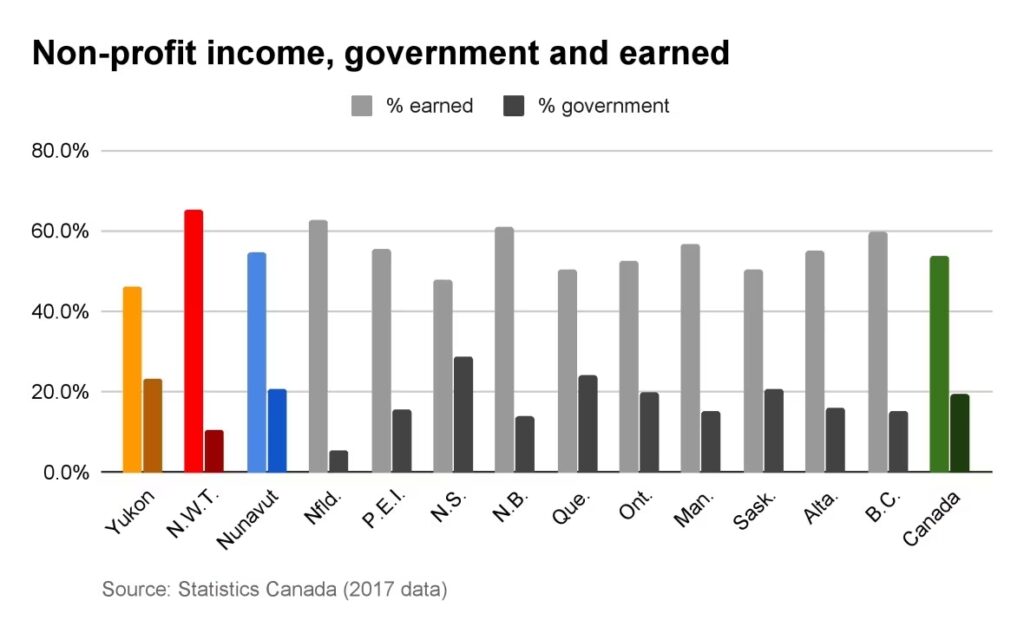Yukon’s non-profit sector is booming. Is that a good thing?
In the past five years, the number of registered societies has increased 40%

When Many Rivers, a non-profit offering counselling services in Whitehorse, shuttered its doors last year, it set off some soul-searching in Yukon’s non-profit community.
The end of Many Rivers was far from dignified — clients cut off, employees locked out, and calls for a forensic audit as an estimated $500,000 of taxpayer money was allegedly missing or misallocated.
And as some community members rallied to revive the troubled organization, others called on the Yukon government to re-examine its relationship with the non-profit sector.
Despite the fate of Many Rivers, non-profits in the territory are in fact booming. In the past five years, the number of registered societies has grown from just over 600 to more than 850. That’s one non-profit for every 49 people in the territory, based on 2020 population estimates.
Number of non-profits in Yukon

That milestone is greeted with muted enthusiasm by many in the territory’s non-profit sector.
Non-profits rely on the availability of skilled board members and willing volunteers, which are rapidly becoming short in supply.
We should maybe look at that challenge before it becomes a crisis.
Wendy Morrison, non-profit manager
The increasing difficulty in finding qualified individuals to sit on non-profit boards makes it harder to get the kind of leadership that prevents the “poor management” at the heart Many Rivers’s decline.
“My estimate is that there is one in five working Yukoners that sit on a board of directors,” said Wendy Morrison, a longtime non-profit manager and the author of a recent Yukon News editorial singing the sector’s praises.
“We should maybe look at that challenge before it becomes a crisis.”
Extension of government
The Many Rivers saga highlighted another fact about Yukon’s non-profit sector — the Yukon government is happy to outsource public services to non-profits.
The territory’s public contract registry shows hundreds of thousands of dollars in payments to societies every year in the past decade to offer services from recycling to translation to inmate’s psychological assessments.

As Many Rivers’s rapid decline demonstrated, relying on non-profits to provide public services can have consequences for clients when problems arise. But it also has consequences for the sector as a whole.
On aggregate, Yukon’s non-profits are much more reliant on government funding than almost anywhere else in Canada.
According to Statistics Canada, nearly a quarter of all non-profit income in the territory comes from government — more than double the amount in the N.W.T.

Advocates for non-profits argue they are more efficient users of that money than government departments.
“In many cases, charities and non-profits deliver services at a rate less than what government could afford,” said Bruce MacDonald, president and CEO of Imagine Canada, an organization that supports the development of non-profits across the country.
“Charities that are smaller can actually make decisions to adapt or change programs based on emerging needs in their communities.”
Over-reliance on government funding
But non-profits are not merely responding to community need — they’re also responding to the demands of their funders, including the territorial government.
“There is a certain amount of evolution,” said Linda Casson, vice-president of Volunteer Bénévoles Yukon, an organization that pairs volunteers with non-profits in the territory. “You do find that groups end up tweaking their core focus to try to align to [government] funding.”

According to Daniel Cheng, a non-profit researcher at the Humphrey School of Public Affairs in Minnesota, an over-reliance on government funding can mean non-profits become less responsive to the demands of clients.
“Non-profits may only choose those areas that government has as a priority,” said Cheng. “[That] kind of compromises some of the initial strengths of the sector … [in] picking up some of the spots where the government does not pay enough attention.”
Smaller non-profits, meanwhile, may struggle under the burden of paperwork imposed by the onerous reporting requirements for many grants.
The amount of government funding going to the sector may in fact be misleading, said Casson with Volunteer Bénévoles Yukon. As a few large non-profits claim most of the core funding, “smaller ones … really struggle along on a pittance,” she said.

Cheng said government should be careful about how it invests in the sector as a result. Larger, older non-profits quickly become powerful lobby groups, he said, that can drive the priorities of government for years to come.
“These groups will be strong interest groups in influencing subsequent [spending].”
Privatization by another name?
Imagine Canada’s MacDonald said these issues could be solved by allowing non-profits to generate more of their own money.
In 2017, the territory’s non-profits made just 46 per cent of their income from memberships and sales — the lowest percentage in the country.
“I think we’re starting to witness an evolution of that, to try to allow organizations to get involved in earned income,” said MacDonald.
Yet the idea of profitable non-profits, earning income from their clients, raises concerns about whether the government’s outsourcing to non-profits is really just privatization by another name.
Researcher Cheng said outsourcing to non-profits may actually represent “a deeper level of privatization” than the conventional model of partnering with corporations to deliver services.
“We’re now seeing [with non-profits] … the decision-making, the planning, the designing of the services are also largely privatized.
“These entities are not just the tools of the government,” Cheng said. “[They] want to come to the table.”
